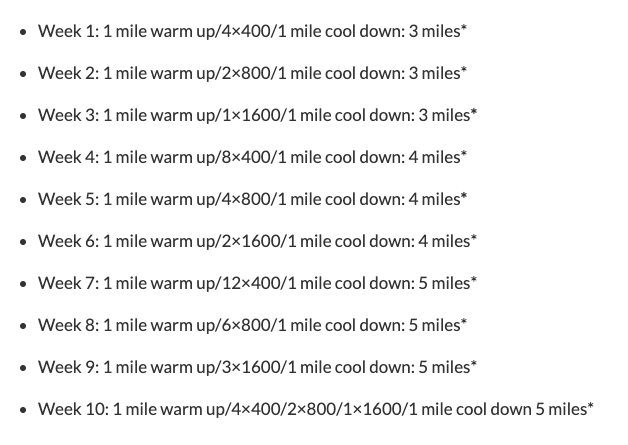
The best way to become a stronger and faster runner is to incorporate speed work into your training schedule. It doesn’t need to be complicated, and when you’re just getting started, it doesn’t even need to be “fast.” It just needs to be hard. I wish I had learned earlier how important Speed Work for Beginners really is!
Why Speed Work Works
Pushing yourself beyond your comfort zone is the only way to force your body to adapt to the pressure and physically become stronger. You can poke along running at your easy pace forever. You can gain endurance, but you won’t get much faster. Even if you don’t consider yourself to be a “real runner” you can benefit from a little speed work!
Why I believe in speed work for beginners (and all runners)
I started running marathons in 2001 when I moved to San Diego as a way to make friends. Little did I know how life changing it would be for me. I was not an athletic kid or teenager, and in fact, I almost didn’t graduate from high school on time because I was lacking PE credits. Those who know me today can see the ridiculous irony of this. I documented my entire love affair with running in a long post I wrote just after the Boston Marathon 2014, called Addicted to Running.
Speed Work was a GAME CHANGER for me
Long story short, I went from running 4:45 marathon and seeing the Boston Marathon as a fairy tale. To crossing that iconic finish line, not once but two times and holding a marathon PR of 3:29. There were only two things I did differently; I lost 20 pounds and I started doing speed work at the advice of my running coach. I’m not sure if speed work is the chicken or the egg to weight loss, but needless to say, I got faster. The end result was a marathon pace of 11:00 min per mile to 8:00 – yahoo!
Can you benefit from speed work?
Yes. I don’t even need to know you to tell you that you can benefit from speed work. Even if you’re a super-beginner-runner and you feel like track workouts are for the pros. Let me tell you, they are for everybody and anybody can benefit. I hate the old saying “no pain – no gain” because it sounds so outdated and there is a fine line between the pain of progress and pain of destruction.
But the spirit and science of speed work does stem from this concept. If you feel like you want to throw up after an interval, you’re doing it right. Your body is an amazing machine and it’s oh-so-smart. If you’re consistently pushing it harder, to the point of discomfort, it will respond by improving in strength and efficiency.

How to start doing speed work
If you run several days a week, devote one day to “speed work.” There are hundreds of types of workouts you can do, but the simplest will include repeats of the most common distances, 1 mile, 800m (1/2 mile) and 400m (1/4 mile). You’ll do 1-3 miles of “work” in your entire run of 3-5 miles between warm up and recovery times. You can vary your workout each week with different distances and progress the total distance over time. It could look something like this:

After week 10, pick your favorite workouts to repeat or try new ones. Every 4 weeks, do the week 10 workout again to measure your progress. So long as you truly run as hard as you can in the intervals, you will get faster. It’s one of my most favorite things about running. Your output (progress) is 100% directly correlated to your input (effort).
You can also try one of my Community Run Challenges for a little structure as well!
How do you feel about sped work and/or what is your favorite speed workout?
*This post was originally published on Eat. Drink & be Skinny*
About The Author
Teresa Howes
I’m a board certified holistic nutritionist, certified personal trainer, plant forward & flexatarian lifestyle enthusiast and self proclaimed Veggie Ninja. I’m here to inspire and illustrate how delicious, simple and fun healthy living can be!
Related Posts
30-Day Full Body Challenge
If you’re ready to push your body differently, every day of the week…
November 25, 2024Two Week Body Reset Plan
Guess what happens in 2 weeks from today? This body of mine turns 45 years…
July 6, 2021


